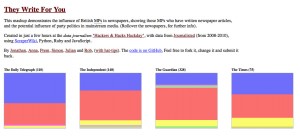The Atlantic has a feature explaining how, and why, developers create a variety of news apps at Washington Post. The article includes details of this tool that was designed to allow WashingtonPost.com visitors to read tweets written in Russian following an explosion at Moscow airport in January, plus several other examples of creating apps for planned events and for breaking news.
With dozens of stories appearing in the Washington Post every day and only so many web developers, there’s only so many ideas the team can deploy. Deciding which ideas are acted upon comes down to what [senior web developer Dan] Drinkard described as ‘level of effort versus perceived value and impact’. His job is to balance long term projects that center around a news event they know is coming – a major debate or election, for instance – with these short one-offs. ‘It’s sort of split three ways,’ he explained. ‘There’s the big stuff, initiatives that you know you’re going to spend the next six months working on. There’s the little stuff that you spend one or two months on, or even a matter of weeks, and there’s the little stuff that comes up every day so you can help unstick something.’
Some of these projects include an interactive map allowing readers to follow the movement of Middle East protests, a Google Maps tool to allow Marine Corps Marathon attendees to geo-tag their photos, and QR codes in the print edition of the paper that aim to drive readers to further coverage online.
[Deputy editor Cory] Haik said that not every interactive item the Post launches has news value – some, like the Charlie Sheen quote randomizer, are mainly for fun. When the Washington Post ran a front-page photo of a shooting of the next Transformers installment, it invited readers to submit their own Photoshop version of the image. While I’m sure a serious foreign policy enthusiast would enjoy a Twitter aggregation of a Pakistani governor’s tweets, sometimes you have to feed your Reddit readers with some sad Keanu Reeves.
